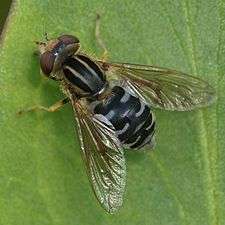Lejops
| Lejops | |
|---|---|
 | |
| Lejops interpunctus female | |
| Scientific classification | |
| Kingdom: | Animalia |
| Phylum: | Arthropoda |
| Class: | Insecta |
| Order: | Diptera |
| Suborder: | Brachycera |
| Infraorder: | Muscomorpha |
| Section: | Aschiza |
| Superfamily: | Syrphoidea |
| Family: | Syrphidae |
| Subfamily: | Eristalinae |
| Tribe: | Eristalini |
| Subtribe: | Helophilina.[1] |
| Genus: | Lejops Róndani, 1857 |
| Subgenera | |
| |
| Synonyms | |
| |
Lejops is a genus of hoverflies.[2][3][4] The majority of the species are found in the Americas and Australia,[5] with the exception of Lejops vittatus which is found in Europe and Asia.
The genus Lejops is closely related to Helophilus, Quichuana and Mallota.[1]
Species
Can be further divided into several subgenera:
Subgenus: Anasimyia - often considered a full genus.
- L. annulipes (Macquart, 1850)
- L. billinearis (Williston, 1887)
- L. borealis (Cole, 1921)
- L. chrysostomus (Wiedemann, 1830)
- L. contractus Claussen & Torp, 1980
- L. distinctus (Williston, 1887)
- L. femoratus Simic, 1987
- L. interpunctus (Harris, 1776)
- L. inundatus (Violovitsh, 1979)[6]
- L. japonicus (Shiraki, 1930)[6]
- L. lunulatus (Meigen, 1822)
- L. perfidiosus (Hunter, 1897)
- L. smirnovi (Stackelberg, 1924)[6]
- L. subtransfugus (Stackelberg, 1963)[6]
- L. transfugus (Linnaeus, 1758)
Subgenus: Arctosyrphus
- L. willingii (Smith, 1912)
Subgenus: Asemosyrphus
Subgenus: Eurimyia
- L. lineatus (Fabricius, 1787)
Subgenus: Lejops
- L. barbiellinii (Ceresa, 1934)[1]
- L. grisescens Hull, 1943
- L. vittatus (Meiden, 1822)
Subgenus: Lunomyia
- L. cooleyi (Seamans, 1917)
Subgenus: Polydontomyia
- L. curvipes (Wiedemann, 1830)
This list is incomplete; you can help by expanding it.
References
- 1 2 3 Morales, Mírian Nunes; Marinoni, Luciane (2008). "Immature stages and redescription of Lejops barbiellinii (Ceresa) (Diptera, Syrphidae) found in bromeliads in Brazil" (PDF Adobe Acrobat). Zootaxa. New Zealand: Magnolia Press. 1830: 37–46. ISSN 1175-5334. Retrieved 2009-09-16.
- ↑ Stubbs, Alan E.; Falk, Steven J (1983). British Hoverflies: An Illustrated Identification Guide (2nd ed.). London: British Entomological and Natural History Society. pp. 253, xvpp. ISBN 1-899935-03-7.
- ↑ Ball, S.G.; Morris, R.K.A. (2000). Provisional atlas of British hoverflies (Diptera, Syrphidae). Monks Wood, UK: Biological Record Centre. pp. 167 pages. ISBN 1-870393-54-6.
- ↑ Van Veen, M.P. (2004). Hoverflies of Northwest Europe, Identification Keys to the Syrphidae (Hardback). Utrecht: KNNV Publishing. p. 254. ISBN 90-5011-199-8.
- ↑ Thompson, F. Christian (2000). "A new genus of Australasian Flower Flies (Diptera: Syrphidae)" (PDF Adobe Acrobat). Studia Dipterologgica. 7: 373–384. ISSN 0945-3954. Retrieved 2009-09-16.
- 1 2 3 4 Barkalov, A.V. "Syrphidae collection of Siberian Zoological Museum". Novosibirsk, Russia: the Institute of Animal Systematics and Ecology, Siberian Branch of the Russian Academy of Sciences. Archived from the original on October 20, 2008. Retrieved 28 July 2009.
This article is issued from Wikipedia - version of the 9/12/2016. The text is available under the Creative Commons Attribution/Share Alike but additional terms may apply for the media files.